Short-term measurement detector tubes
A detector tube system that performs measurements using the GV-100/GV-110 gas sampling pump. The handle on the gas sampling pump is pulled all the way back to create a vacuum inside the cylinder, drawing the gas sample through the detector tube.
This can be used by anyone, anywhere, and at anytime to quickly and easily make an accurate concentration reading.
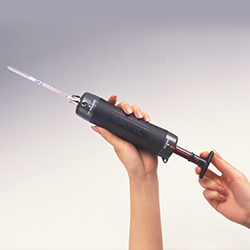
Passive dositubes for time-weighted measurements
Passive dositubes are used to measure time-weighted average (TWA) gas concentrations over longer periods. Dositubes use the principle of the natural diffusion of gas.
A dositube is a glass tube of a specific inner diametre that is filled with a diffuser and chemical reagent in parallel that enable gas to disperse at a constant rate resulting in a longer discolouration and better demarcation. The passive dositube can then be positioned in the worker's breathing zone where it can be attached with a holder and collar clip (separately available: Art.No.710) and the amount of individual exposure can be measured. Stationary use is also possible for TWA measurements of concentration distribution or change within a fixed environment over longer periods, such as the course of a whole day.
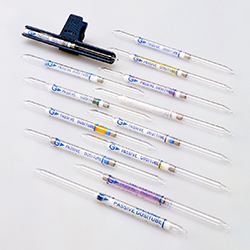
Features
- Compact, lightweight, and versatile(can be used anywhere)
- Easy direct measuring and reading
- No sampling pump necessary
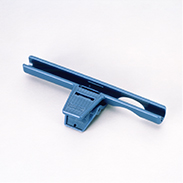


Detector tubes for Automatic air sampling pump
A detector tube that performs measurements using an automatic air sampling pump.
The automatic air sampling pump samples the air sample for a set duration of time and at a set speed via the detector tube. This allows for measurements of malodorous substances, and of the working/indoor environment.
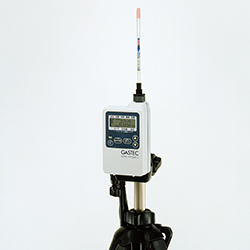
Measuring Procedure
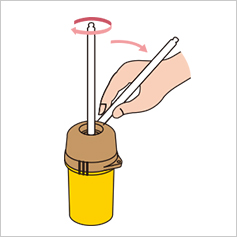
- 1.
- Break tips off the detector tube using the tube tip holder.
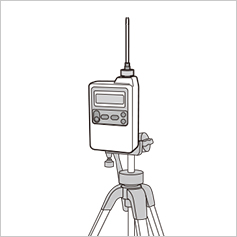
- 2.
- Insert the detector tube to the inlet of the rubber tube holder. Turn the power switch ON. Adjust the flow rate, confirm that the timer of the air sampling pump is set, then push the start button.
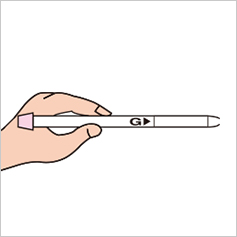
- 3.
- After sampling, remove the detector tube from the rubber tube holder and read the concentration of the tube.
Airtec tubes
Airtec tubes are a convenient and simple system for testing gas cylinders, compressed breathing air and air lines. Industrial operations often produce, or are performed in the presence of harmful airborne contaminants. When self-contained breathing apparatus or other devices are used for respiratory protection, the quality of the breathing air requires special attention. Contaminants entering the compressor or contaminants generated by the compressor or cylinder can be harmful to the worker and the respiratory equipment.
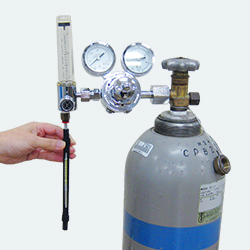
Polytec tubes
The GASTEC polytec system consists of the Model GV-100S Gas sampling pump and the Polytec tubes. The Polytec tubes are unique detector tubes, each having 1 to 8 reaction layers to determine multiple unknown substances in the sample simultaneously. When you pull the handle of the pump and wait for a predetermined sampling time, the colour (s) of the Polytec tube's layer (s) change uniquely according to the contents of the sample. Six types of Polytec tubes are available: Polytec I (No.107), Polytec II (No.25), Polytec III (No.26), Polytec IV (No.27),Polytec V(No.28), and Qualitative analysis tube for fire investigation (No.108). Detailed descriptions are given in the instruction sheets included with individual Polytec tubes. If you already have the Model GV-100S gas sampling pump, you need only to obtain the desired Polytec tubes.
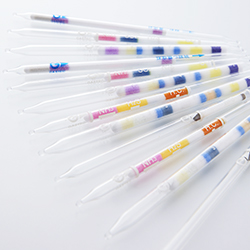
PYROTEC detector tubes
Uses PYROTEC to pyrolytically decompose CFC gas, halogenated hydrocarbon and other gases, converting them into gases that can be measured by detector tube before using a gas sampling pump for measurements.
*Use a combination of a pyro tube, PYROTEC and a gas sampling pump to perform measurements. There are two types of PYROTEC available, No.840 and No.860.
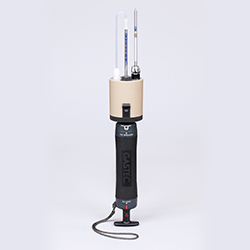
Injection type detector tubes
Uses an injector tube to sample gas samples, which is inserted into a detector tube to perform measurements. Detector tubes used for high concentration carbon dioxide and propane gases apply this feed-in method.
Using the injection measuring
- 1.
- Break off both ends of a detector tube (No.100B for No.601 syringe or No.2HT for No.611 syringe) by using the tube tip cutter.
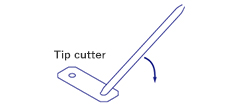
- 2.
- Attach the syringe inlet to the syringe (No.601 or No.611) and collect 20ml of sample into the syringe by pulling its piston.
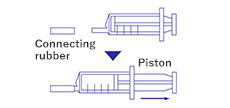
- 3.
- Insert the tube securely into the syringe inlet with the arrow pointing away from the syringe. Inject the sample collected in the syringe into the detector tube in 2 minutes (for No.100B) or 20 seconds (for No.2HT), and read the indication.
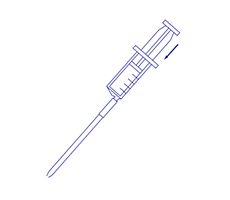
- 4.
- Please see the product manual for details.
Detector tubes for dissolved substances in solution
To measure, simply immerse the detector tube in a sample of liquid (placed in a beaker or other container). Anyone can measure concentrations quickly, easily and accurately on site.
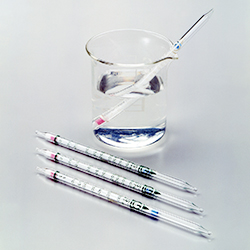
Product search
-
Detector tube Search
-
Search other products
-
Product search






